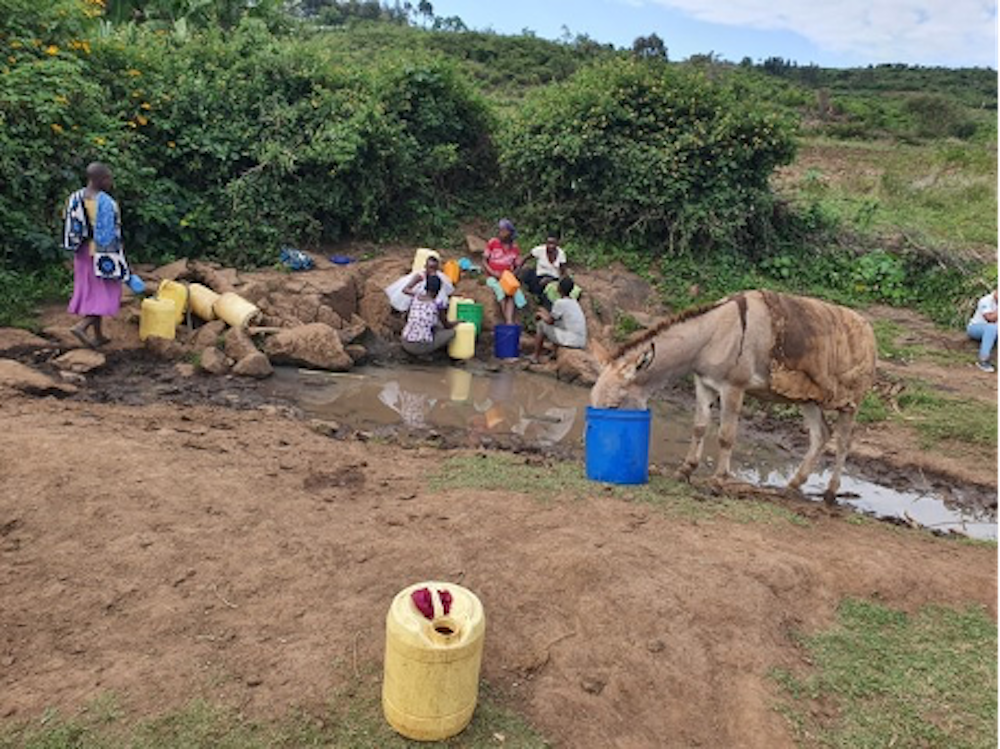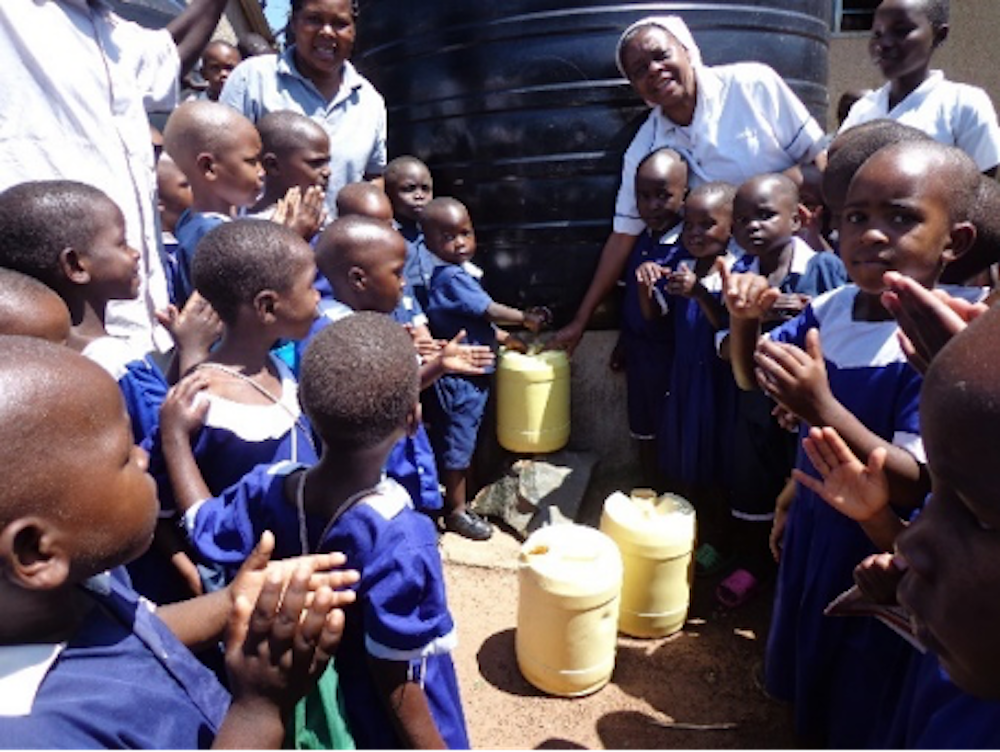
Masanga, a hilly, isolated area in northwestern Tanzania has eight villages that mostly depended on unprotected springs for their water, shared with livestock. The Daughters of Charity arrived in 2007 and started a health center, St. Catherine’s School, a vocational training center, orphanage and more. These facilities and programs relied on rain water catchments or a 10-year-old borehole, but there were often shortages, especially in the dry season. (Courtesy of the Daughters of Charity)
As my office has responded to request after request to find funds to respond to the need for water in clinics, hospitals and schools, I have been stunned by the lack of access to this most basic resource in so many locations around the world. Children scooping up muddy water to carry to their families to drink is cringe-worthy enough, but internationally, one in four health care facilities do not have sufficient water, sanitation or hygiene resources. This puts more than 1.8 billion people at risk, contributing to the spread of preventable infection. The need is a Gospel cry for help.
Knowing that the Catholic Church operates up to 50% of health care facilities in areas where there might otherwise be no health care, there is a great opportunity for the church to help improve the situation. To this end, the Vatican's Dicastery for Promoting Integral Human Development, under the leadership of Cardinal Peter Turkson, has undertaken an unprecedented and important leadership role to help get water, sanitation and hygiene ("WASH") into facilities run by dioceses and congregations in low-resourced countries. The goal is basic safety: things such as having a source of water for use in treatment and disease reduction, and elementary toilet facilities.
Catholic-run facilities are not alone in needing WASH in their health care facilities. However, the church has a better chance of influencing the issue among them than it does in health care facilities in general. And so, the Vatican has brought a powerful voice and a replicable model into the struggle to improve life-saving access to water and sanitation in impoverished locations around the world. They have done the research, invited organizations with the means to help, and offered a clear and simple path to make an investment in life for those in danger of death.
This effort is consistent with the pro-life ethic that addresses all ages and stages of life. It can be illustrated using our smallest family members as an example of the impact of the lack of water in health care facilities. Every year, millions of women haul their own water, of questionable quality, to give birth in facilities where infections are transmitted by unwashed hands, contaminated beds and dirty instruments used to cut umbilical cords. In some places in sub-Saharan Africa, newborns are not named because early death is so common. When hand washing and clean birthing practices are in place, newborn survival rates increase up to 44%, yet more than one million deaths each year are still associated with unclean births.
"It's chilling to think about it," Sr. Adela Orea says, with particular concern for the dangers to vulnerable newborns and mothers. "We have always struggled to be creative, to do what is possible in the impossible, so as not to run as many risks as in the communities, but the risks are the same [in the health care facilities] as when we attend to the birth of a child in a community where you can have many acquired infections." Sister Adela, a Daughter of Charity, is the administrator of San Carlos de Altamirano Chiapas Hospital in southern Mexico, which recently acquired access to water with the assistance of a major donor. This has had a fundamental impact on her hospital, as she said, calling the difference "between day and night." "We have water, we have health, we have life," she said.
Advertisement
In a step toward solutions, the Vatican dicastery has launched an initiative to improve conditions, starting with assessments in 151 facilities in 23 countries, covering areas that offer health care to some 28 million people. These assessments pinpointed some more simple WASH improvement opportunities, as well as things that will require additional technical expertise and outside funding. Each location received their evaluation so that they could begin to make local improvements and begin to plan for those changes and additions that will require outside assistance of expertise and funding.
The next step in the Vatican's process was to share the results and the implications of the surveys and the pathway to solutions. On March 25, Cardinal Turkson and a panel of international experts met virtually with about 100 representatives of foundations, funders and government-related programs. Some participants pledged their assistance immediately during the teleconference. Others are working more privately. Groups including Caritas Internationalis, Catholic Relief Services and involved religious congregations are providing funding venues for those wishing to sponsor or donate toward WASH projects. A "menu" of types of needs by country is available for those who would like to focus their contributions.

Sr. Bibiane Bokamba, director of the Daughters of Charity health center in Masanga, Tanzania, coordinated the community there to get involved with water and sanitation upgrades completed last year in partnership with Water Engineers for the Americas and Africa, an international non-governmental organization, and Sanitation and Water Action (SAWA) an NGO in Tanzania. Now, clean water is available to more than 50,000 people who did not have it before, improving hydration, hygiene and the prevention of communicable diseases. (Courtesy of the Daughters of Charity)
The process will be facilitated in collaboration with the Vatican through the end of this year, but this launch of life-saving activity is not the last step. It is hoped that the awareness gained through these activities will lead to a spreading responsiveness and involvement in making sustainable water and sanitation systems a priority in government funding and private donations wherever they are needed in the world. As Sister Adela said, "Whoever has water, has life," and we are all learning more every day how much an investment in water is an investment in life.
My ministry responds to requests from our sisters in low-resourced countries around the world and helps to raise the funds and resources they need to do their ministries. Over and over, we have raised funds for wells, pit toilets, tanks to catch rain water, and other basic water and sanitation-related supports — all important, but just patches on the big issue, lack of access to water and sanitation systems. Because our major goals as a religious community include systemic change and sustainability, all these efforts are vaguely unsatisfying.
The opportunity to work with Turkson's team at the Vatican on this committee has been a blessing. Representatives of organizations who do not always coordinate their services have joined forces to address this core issue to increase awareness and promote action within the credibility and influence of the church. This voice joins the efforts of the World Health Organization, UNICEF and other international leaders in health to respond to a problem whose impact touches the wellbeing of the world.
This process has helped me to learn that investment in water truly is an investment in life.
For further information about the dicastery's WASH project, please contact: [email protected].




